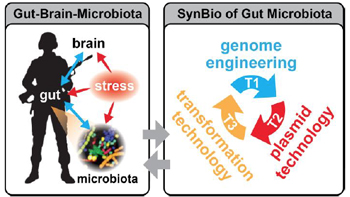News
Harris Wang Named Office of Naval Research Young Investigator

A grant from the Office of Naval Research will support the development of three foundational synthetic biology technologies for engineering the human gut microbiota.
Harris Wang, an assistant professor in the Columbia University Department of Systems Biology, has been selected for the Office of Naval Research 2015 Young Investigators Program. This highly selective program promotes the development of early-career academic scientists whose research shows exceptional promise and creativity. With the support of this award, Dr. Wang will extend his research in the field of synthetic biology to develop new technologies for engineering the gut microbiome, the ecosystem of bacteria that inhabit the human digestive system. These new methods, Wang anticipates, could provide new ways of designing communities of different microbial species and ultimately modulating interactions between the gut, the immune system, and the brain.
Wang’s project builds on recent observations suggesting that interactions between the brain and bacteria in the gut affect human physiology through the enteric nervous system (ENS). Changes in the composition of the microbiome, for example, can lead to various acute and chronic diseases that can affect wellbeing. In addition, emerging evidence suggests that neuropsychiatric factors such as stress can affect the composition and function of bacteria in the gut. This bidirectional communication can regulate how we physically experience emotions and even make decisions.
Within the context of synthetic biology, Wang’s research addresses three significant limitations in scientists’ current ability to engineer gut microbial communities. One is the challenge of making site-specific targeted changes to bacterial genomes. Another is the limited repertoire of plasmids and mobile vectors for delivering modified DNA into target bacteria. Furthermore, there is a general lack of methods to introduce DNA into multiple species of bacteria at the same time. These problems need to be solved if synthetic biology is to become effective in engineering bacterial communities.
The Wang Lab aims to address these challenges by developing a new, targeted genome engineering approach, expanding the library of useful plasmid vectors, and exploring new DNA transformation methods in microbial consortia.
Under the auspices of the Office of Naval Research grant, the ability to engineer the microbiome could lead to new strategies for improving resilience to stress and operational performance in naval personnel. If successful, Wang’s project could lead to much wider applications, however, providing a transformative and foundational platform for engineering communities of microbes.
— Chris Williams